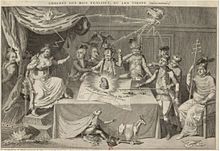Le congrès des rois
| Le congrès des rois | |
|---|---|
| Opéra comique by Antoine-François Ève | |
 | |
| Description | Congress of the Allied Kings, or the Tyrants (uncrowned), print of Barnabé-Augustin de Mailly, 1794[1][a]. |
| Native title | Le congrès des rois |
| Translation | Congress of the Allied Kings |
| Other title | The Tyrants (uncrowned) |
| Librettist | Henri-Montan Berton |
| Language | French |
| Premiere | 26 February 1794 Opéra-Comique, Paris, France |
Le congrès des rois (The Congress of the Kings) was a 3-act French Revolutionary opera of the genre comédie mêlée d'ariettes with a libretto by De Maillot, a stage name used by Antoine-François Ève early in his career, and music by a collaborative of twelve composers (see below). It was a satire directed against the "enemies of France". The libretto and most of the music (except for that by Henri-Montan Berton) has been lost.[2][3]
The composition of the opera was ordered by the Comité du Salut public (
The opera tells the story of an imagined meeting of monarchs at the court of Prussia to discuss the partition of France. Participants include the kings of England, Spain,
The opera was later denounced in the Conseil général of the
The libretto has not been found. A piano–vocal score in manuscript form of the music by Henri-Montan Berton is located at the Bibliothèque nationale de France (Département de la Musique, Ms. 3649).[2]
Composers
- Henri-Montan Berton
- Frédéric Blasius
- Luigi Cherubini
- Nicolas Dalayrac
- François Devienne
- Prosper-Didier Deshayes
- André Grétry
- Louis-Emmanuel Jadin
- Rodolphe Kreutzer
- Étienne Méhul
- Jean-Pierre Solié
- Armand-Emmanuel Trial (Trial fils)
References
Notes
- ^ The names of the characters, with the nicknames given by the artist, are shown as image annotations on the file on Wikimedia Commons.
Citations
Sources
- Pougin, Arthur (1891). L'Opéra-Comique pendant la Révolution de 1788 à 1801: d'après des documents inédits et les sources les plus authentiques. Paris: Albert Savine.
- ISBN 978-2-87009-898-1.
